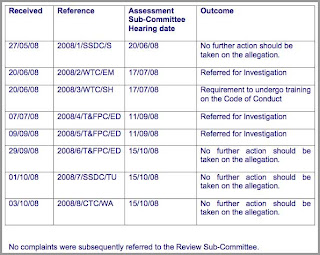Back in December 2008, I attended a Town Council meeting and witnessed Chair Keenan muzzle Cllr Raybould (see M&B, 'Shut up Brian', 17th December 2008) when Raybould was about to embark on a statement about the leasing of the Parish Rooms to St Michael's Church.
At the time, this didn't seem terribly interesting other than it seemed hugely co-incidental that St Michael's would want to pay £155k for a lease on the Parish Rooms at the same time as the Council was looking to spend £155k on refurbishing the Tin Dunny. Probably a complete co-incidence, especially as Tony Canvin went on to spend twice that sum before he threw his toys out of the pram and resigned.
In the final analysis, the leasing of the Parish Rooms never became an issue because, as I remember it, the Town Council put it about that the Charity Commission had blocked the arrangement and I always wondered why. Recently I did an FoI enquiry of the Charity Commission to find out what exactly went on and it makes for interesting reading.
In December of 2005, Roger Calderwood writes to the Charity Commission enquiring (about the Parish Rooms) "Is it possible to sell the property, with the proceeds being used in connection with the new community hall, thereby continuing the charitable nature of the Lady Smith Memorial, but in a modern building?" Calderwood goes on to say that the Parish Rooms have ".......operated effectively as a church hall for many years...............and it is likely that the church would wish to purchase the hall."
At this point it is important to explain the status of the Parish Rooms which are controlled by the Lady Smith Memorial, registered charity no.304629
The charity was established in 1896 and provided a site for the construction of a building, to be known as the Lady Smith Memorial, to be used as a permanent reading room "for the intellectual, social and moral benefit of the inhabitants of Somerton." In 1953, possibly because the then trustees were not performing their function, the Minister of Education issued an order removing the then trustees and making Somerton Town Council (ie the Councillors) trustees. This did not transfer the 'ownership' of the building which remained within the Lady Smith Memorial.
So, in December 2005, Calderwood (on behalf of the trustees?) wants to know if the trustees can dispose of the Lady Smith Memorial Parish Rooms and the Charity Commission write back that, contrary to the story put about by the then Town Council, they can dispose of the property. But, for the Town Council, the devil is in the details where, in January 2006, the Charity Commission state:
"The Commission takes the view that the trustees can sell the land provided they purchase property which is to be used for the same purpose...." The Commission goes on to say,
"This would of course mean that any new hall would have to be held on trust for the purposes of "a Reading room and otherwise for such purposes tending to the intellectual social and moral benefit of the inhabitants of the parish of Somerton."" What this meant, in practice, is that the proceeds of any sale would have to be held within the Lady Smith Memorial and invested in a project under the control of the Lady Smith Memorial and subject to Charity Commission regulation. Given the allergic response of the Keenan/Canvin administration to any sort of accountability, this proviso was clearly an impediment.
All then went silent until December 2008 when Chubb Bullied, acting for either the Lady Smith Memorial or Somerton Town Council (as trustees), enter the fray, clearly instructed to find a mechanism whereby the trustees of the Lady Smith Memorial (ie Somerton's town councillors) could sell the hall (ie the Parish Rooms) and give the funds to the Town Council. Another letter from Chubb Bullied dated 6th February 2009 details their consideration of the issues and discloses,
"that £155,000 be invested in erecting another facility by the Parish Council to be used for broadly similar objects. A deal has already been done in principle with the Church and they anxiously await a lease." Chubb Bullied also intimate that they may seek Counsel's opinion on the matter, a disclosure which may speak more about the Town Council's desperate need for cash than it does for any desire to obtain a balanced opinion.
This effort causes the Charity Commission to write in April 2009,
"As we explained in our first letter, we note the use of the building by the Town Council for its statutory duties that may constitute a breach of trust." (Similarly, I wonder if having SSDC based there was also a breach.) More significantly, the Charity Commission go on to examine options such as a shared use, with the church, of the Parish Rooms, or an outright sale. In all of these options, the Charity Commission refer to conflicts where trustees may be members of the church and/or councillors and the Charity Commission suggest the appointment of independent trustees (not with Keenan/Canvin in charge). Most importantly, the Charity Commission state, quite clearly, that any rent or funds raised by a sale or lease must not go into Council funds for general community purposes.
The April 2009 letter from the Charity Commission seems to have been the final nail in the coffin and Chubb Bullied write to them in May of 2009 saying that "matters will rest just as they are."
And I wouldn't have written this piece unless there had been another aspect to the story and that is provided by the involvement of The Somerton Church Lands (reg no.244670) which was set up to gather property and rents to support St Michael's Church in Somerton. Somerton Church Lands would have been the source of the funds to buy the lease on the Parish Rooms and, in 2008, the Chairman of the trustees was none other than erstwhile Keenan/Canvin supporter and apologist, Pat Mountain.
In all the to-ing and fro-ing about the Parish Rooms, I simply couldn't see what benefit would accrue to the church by taking a lease on the property. Much was made in the various correspondence about how the use of the Parish Rooms would not change so why would the church pay £155,000 for a lease? The answer to that question still escapes me. From where I sit, the deal was simply a mechanism whereby £155,000 could be obtained by Somerton Town Council, from church funds, to be spent on the refurbishment of the Tin Dunny.
The Charity Commission referred to conflicts regarding the position of trustees to the Lady Smith Memorial being either councillors or church members or both. The same conflicts could apply to Mr Mountain as Chairman of the Trustees of Somerton Church Lands and as a supporter of the Keenan/Canvin regime and of their activities.
Thankfully, the Charity Commission were on the ball and made sure that Lady Smith Memorial funds didn't end up being sunk into the Dunny. Equally, they also ensured that Somerton Church Lands funds stayed where they were. But the potential conflicts remain where Somerton councillors are trustees to the Lady Smith Memorial and, with the departure of Pat Mountain from Somerton Church Lands, Somerton Town Council's Clerk, Roger Calderwood, now enjoys a position in all three organisations.
Stay frosty.





















